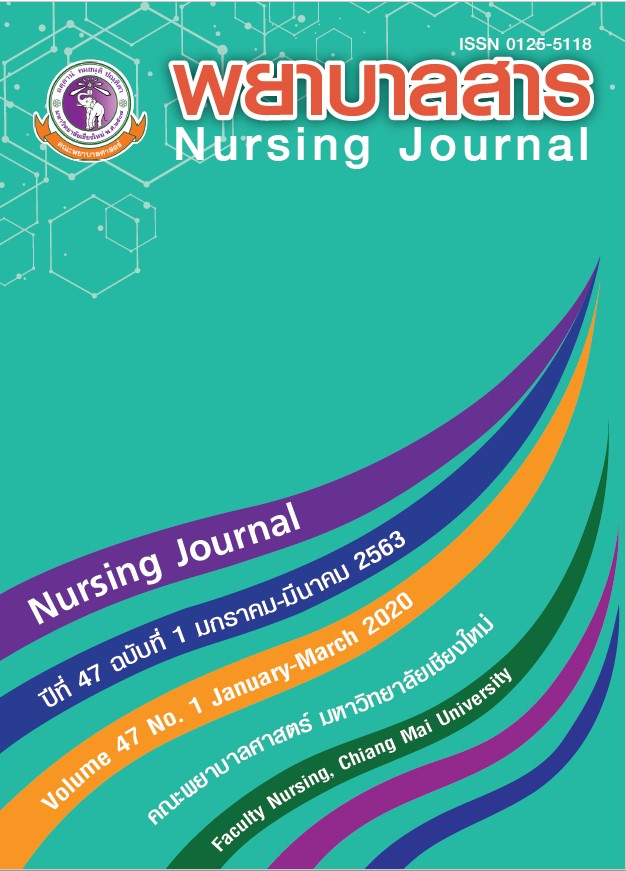The Effect of an Empowerment Program on Quality of Life Among Older Persons with Stroke
Keywords:
Empowerment, Quality of life, Stroke in older personAbstract
Stroke that occur in an older person directly impacts their functional ability and may cause psychological problems. These consequences often lead to feelings of powerlessness in controlling or managing their symptoms and disability, resulting in decreased quality of life. Thus, to improve quality of life, older persons in this group should be empowered. This experimental research aimed to compare quality of life of the older person with stroke before and after completing the empowerment program and to compare the quality of life of the older person between the groups completing the empowerment program and those who did not participate in the program. Sample group included 88 older persons with stroke. All subjects were randomized by using permuted block design method into an experimental group and a control group. Each group contained 44 persons. Both groups had their quality of life measured using the Stroke impact scale (SIS). The experimental group completed the empowerment program which is based on Gibson’s model, composed of four stages of empowerment activities including: (1) discovering reality, (2) critical reflection, (3) taking charge, and (4) holding on. Data were obtained in eight weeks. Descriptive statistics and t-test were used for data analysis.
The results of this study revealed that
- The quality of life for the older persons with stroke after completing the program was statistically and significantly higher than before at level of p < 0.05
- After completing the program, the quality of life of older persons with stroke was statistically and significantly higher than that of the group without the program at level of p < 0.05
The results of this study show that the empowerment program can improve the quality of life of older persons with stroke. It can be considered as a useful intervention to improve the quality of life for this group of the older persons.
References
Burns, N., & Grove, S. K. (2005). The practice of nursing research: Conduct, critique, and utilization (5thed.). Philadelphia: W.B. Saunders.
Duncan, P. W., Lai, S. M., Tyler, D., Perera, S., Reker, D. M., & Studenski, S. (2002). Evaluation of proxy responses to the Stroke Impact Scale. Stroke, 33 (11), 2593-2599.
Gibson, C. H. (1991). A concept analysis of empowerment. Journal of Advanced Nursing, 16 (3), 354-361.
Gibson, C. H. (1995). The process of empowerment in mothers of chronically ill children. Journal of Advanced Nursing, 21 (6), 1201-1210.
Hafsteinsdottir, T. B., & Grypdonck, M. (1996). Being a stroke patient: A review of the literature. Journal of Advanced Nursing, 26 (3), 580-588.
Kamontip Harnphadungkit. (2007). Rehabilitation for Stroke Patients. Bangkok: Works of textbooks, journals, and publications, Medical Technology Center Faculty of Medicine Siriraj Hospital Mahidol University. (In Thai)
Institute of Neurology, Department of Medical Services, Ministr y of Public Health. (2014). Stroke Patient Nursing Guidelines. Bangkok: Institute of Neurology. (In Thai)
Office of Policy and Strategy, Office of the Permanent Secretary, Ministry of Public Health. (2012). KPI. Retrieved from http://www.healthdata.moph.go.th/kpi (In Thai)
Rukskul, P. (2007). Cerebral Vascular Disease. Bangkok: Thammasat University. (In Thai)
Downloads
Published
How to Cite
Issue
Section
License
บทความที่ได้รับการตีพิมพ์เป็นลิขสิทธิ์ของวารสารพยาบาลสาร
ข้อความที่ปรากฏในบทความแต่ละเรื่องในวารสารวิชาการเล่มนี้เป็นความคิดเห็นส่วนตัวของผู้เขียนแต่ละท่านไม่เกี่ยวข้องกับมหาวิทยาลัยเชียงใหม่ และคณาจารย์ท่านอื่นๆในมหาวิทยาลัยฯ แต่อย่างใด ความรับผิดชอบองค์ประกอบทั้งหมดของบทความแต่ละเรื่องเป็นของผู้เขียนแต่ละท่าน หากมีความผิดพลาดใด ๆ ผู้เขียนแต่ละท่านจะรับผิดชอบบทความของตนเองแต่ผู้เดียว






